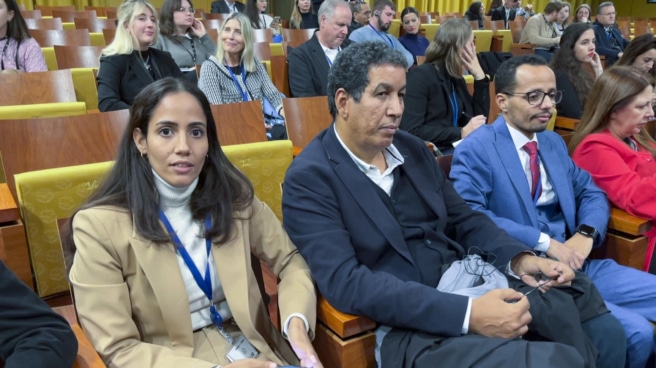

Soumare MP Tesha Sidi and the representative of the Polisario Front in Spain, Abdoula Arabi, attend a CJEU hearing examining the legality of the EU-Morocco trade and fisheries agreement on Tuesday in Luxembourg. On 21 March 2024, the EU Attorney General will give his opinion on the legal validity or invalidity of the EU-Morocco trade and fisheries agreement.
General Counsel European Union On March 21, 2024, it will give its opinion on the legal validity or invalidity of the trade and fisheries agreement between the EU and Morocco, which the Polisario Front rejects because it includes the export of agricultural and fishing products from the territories and waters. Western Sahara.
The date of March 21 was announced on Tuesday by the Attorney General herself, Croatian Tamara Kapeta, at the end of the second and final hearing of the case at the Court of Justice of the European Union (CJEU), examining the resources of the European Commission and the European Council, which brings together the governments of each EU country, oppose the annulment of agreements with Morocco , reports Efe.
In 2021, the General Court of the European Union (TGEU) accepted two appeals by the Polisario Front to annul the trade and fisheries agreements, finding that they should have been approved by the Sahrawi organization as the representative of the people of Western Sahara. , although it did not paralyze its consideration until a final decision was made.
The Commission and the European Council appealed the decision of the TGEU, the European Court of First Instance, to the CJEU, the Union’s highest judicial body, arguing that the Polisario does not have the right to represent the Sahrawi people in international courts.
General Counsel, very inquisitive about Brussels.
The CJEU judges devoted their latest hearing on Tuesday to questioning the parties involved in the dispute, although the most inquisitive in their questioning was the EU attorney general, whose opinion usually guides the judges’ final decision. Council and European Commission.
The Prosecutor General wanted to find out whether Morocco is obliged to indicate through a different label the origin of fruits and vegetables produced in Western Sahara and imported from there to the EU.
The agreement signed with Brussels requires this distinction to be made, but the European Council lawyer involved in the dispute Frederic Naertacknowledged that the responsibility for correct confirmation of origin depends on the good work of the Moroccan authorities.
“The agreement requires that there be a competent authority that can exercise this control, and today in Western Sahara there are no authorities that could exercise the functions of a normal state,” Naert justified.
The Attorney General also wanted to know what the consultations carried out by the European Commission with civilians and economic agents in Western Sahara were before the signing of the agreement with Morocco, and how Brussels justifies before the CJEU that the agreements had the consent of the Sahrawi people, as stated in the ruling TGUE 2021, did not exist.
As far as I understand, they did not ask the Sahrawi people for any consent.
At one point in his response, the EU lawyer involved in the trial, Spanish Daniel Callejaassured that during these consultations Brussels wanted to “assess the benefits” that the agreement with Morocco would have for the population of Western Sahara, and that it would amount to 54,000 new jobs and savings of 80 million euros in exports thanks to preferential tariffs.
In her response, the Attorney General toughened her tone, considering that Calleja’s response had not “clarified anything to her” and directly asked the Commission whether she had sought the consent of the Saharawi people to conclude an agreement with Morocco.
“As far as I understand, they did not ask for any consent from the Sahrawi people, they were simply checking whether there were positive consequences for them,” Capeta concluded.
Lawyer of the Polisario Front, Gilles Deversalso intervened to question the legitimacy of the consultations being carried out by Brussels, since, according to him, the economic agents and civil organizations of Western Sahara are largely dominated by Moroccan “settlers”, and confirmed that the Commission’s consultations do not “distinguish” them from indigenous population.
The Polisario Front hopes for a favorable solution
There was optimism among the Sahrawi delegation following the hearing after the oral hearing phase concluded on Tuesday. The representative of the Polisario Front in Spain, Abdoula Arabi, “hoped” that the CJEU decision would “finally nullify” the trade and fisheries agreement, “including in it resources that do not belong” to Morocco.
In statements to Efe after the hearing, the Polisario spokesman predicted that the verdict would “strengthen” the Sahrawi people “in their struggle for self-determination and independence” and “break with the propaganda” that he said Morocco was spreading “with the help of a European Union country” to take on self-sovereignty over Western Sahara.
Arabi expressed regret that the European Commission tried to convince the court on the basis that trade agreements would benefit the Sahrawi people, as, in his opinion, the “necessity” prevails that the pact be approved by the “legitimate representative of the people.” “Sahrawi, that is, the Polisario Front.”
In a 1979 resolution, the UN General Assembly called the Polisario Front “the representative of the people of Western Sahara” and recommended that the organization participate “fully” in finding a solution to the conflict.
The EU is Morocco’s main trading partner. In 2022, 56% of Moroccan exports came from the bloc of communities, while 45% of imports came from the Union. For the EU, Morocco is also a key partner on the southern shore of the Mediterranean.
Source: El Independiente